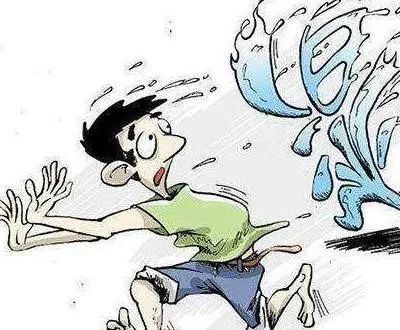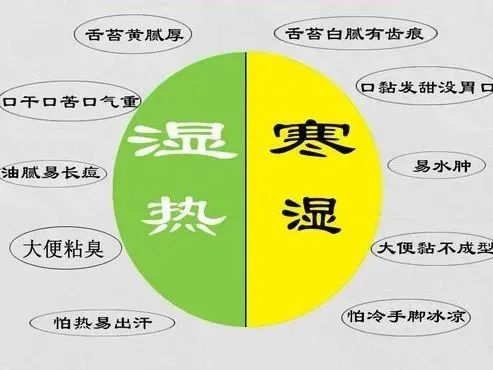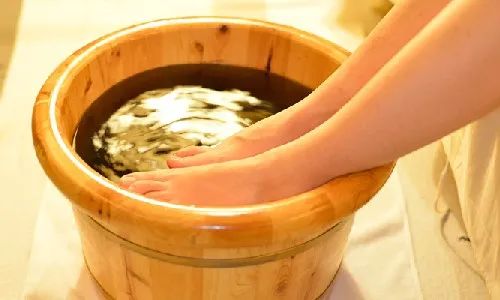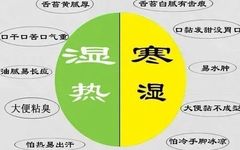Every summer, do you often experience the following issues: swollen eyelids and dark circles in the morning, a constant feeling of fatigue, heavy legs that are hard to move, an oily face prone to acne and pimples, greasy hair, and sticky stools that are hard to flush? These are all caused by excess dampness in the body.


What is “Dampness”?

The so-called “dampness” refers to the “damp evil” in Traditional Chinese Medicine (TCM). In simpler terms, it is the excess waste water, “toxins”, and metabolic waste in our body, which can be considered as bodily garbage, sticky and dirty substances!

Where does Dampness come from?

The dampness in our body comes from two sources: external dampness and internal dampness.
External Dampness: This is often caused by humid weather, exposure to rain, or living in damp conditions, which invades the body as an external damp evil.
Internal Dampness: This is mainly related to the spleen and stomach. For example, overeating, consuming too much greasy or sweet food, or eating cold foods can impair the spleen’s ability to transform and transport, leading to “water dampness stagnation”. Ultimately, dampness is a result of the dysfunction of the spleen and stomach.

Why is Dampness more prevalent in Summer?

Damp evil is one of the six external pathogens, and it is said that “dampness arises in the long summer”. Summer is not only hot but also often rainy, causing heat to stir dampness. Additionally, the body sweats profusely, and pores open, making it easy for “damp evil” to invade. Furthermore, during summer, people often use air conditioning, sweat less, and prefer cold foods, which can damage the spleen and stomach, impairing the transformation of water and dampness. The combination of internal and external dampness leads to damp evil stagnating in the body, making it difficult to expel. However, it is worth noting that summer is also a time when yang energy is strong, and metabolism is fast. If one can manage their health well during this time, it can help expel dampness. Therefore, summer is considered a golden period for eliminating dampness.

What harm can Dampness cause?

Skin: Dampness accumulating under the skin can lead to various skin diseases, such as eczema, athlete’s foot, hair loss, lower limb ulcers, oily skin, and acne.
Joints: Dampness entering the joints can form cold dampness, often triggering pain in the neck, shoulders, waist, and legs.
Spleen and Stomach: When dampness is heavy in the body, it can easily lead to nausea, vomiting, loss of appetite, stomach bloating and pain, diarrhea, and constipation.
Gynecological Issues: Dampness descending can cause women to experience excessive and foul-smelling vaginal discharge, which can lead to gynecological inflammation in severe cases.
Others: Dampness can accumulate as water, leading to phlegm. If phlegm stagnates, it can result in cardiovascular diseases such as coronary heart disease and stroke, as well as conditions like hyperlipidemia, thyroid nodules, lung nodules, uterine fibroids, and even malignant tumors.

How to determine if you have Dampness?

Check if you have Cold Dampness or Damp Heat?
There is a saying in TCM: “A thousand cold days are easy to remove, but dampness is hard to eliminate.” The difficulty in removing dampness lies in its tendency to entangle with other conditions. Dampness entangled with cold is called cold dampness; dampness entangled with heat is called damp heat. Many people find themselves struggling to eliminate dampness without improvement, possibly because they are trying to eliminate the wrong type of dampness. To effectively eliminate dampness, one must first learn to identify the type of dampness.
Cold Dampness: Often accompanied by symptoms of yang deficiency, feeling more comfortable drinking hot water, reduced appetite, a bland taste in the mouth, abdominal bloating, and loose stools with a white greasy tongue coating.
Damp Heat: Generally robust, prone to acne, dry and bitter mouth, chest fullness, yellow and loose stools, and a yellow greasy tongue coating.

Recommended TCM Tips for Eliminating Dampness
Gua Sha, Cupping, Moxibustion
Gua Sha, cupping, and moxibustion all have certain effects on eliminating dampness. However, it is important to note that pregnant women, those with deficiency of qi and blood, hypertension patients, children, and heart disease patients should avoid Gua Sha; those with skin allergies, children, heart failure, and those who are too thin should not undergo cupping; moxibustion is recommended at the Zu San Li (足三里) point, which can be beneficial for both cold dampness and damp heat. “One needle at Zu San Li is worth a whole chicken”; it is known as the longevity point, but caution is advised for those with heat-type constitutions, high fever, and hypertension.

Foot Soaking
It is best to use a deep basin with a large bottom area for foot soaking, allowing the water to cover the ankles. The water temperature should be around 40 degrees Celsius, and soak for about 20 minutes until you sweat slightly. Be careful not to sweat too much, as sweat is the fluid of the heart, and excessive sweating can lead to symptoms like palpitations and dizziness. For those with heavy cold dampness, it is recommended to add mugwort, Sichuan pepper, or ginger to the soaking water.

Dietary Therapy
To Eliminate Cold Dampness
(1) Ginger and Jujube Tea: 3 slices of ginger and 3 jujubes. Boil on high heat, then simmer for 10-15 minutes.
Effect: Eliminates cold and dampness, harmonizes the nutritive and defensive qi. Those with excess liver fire, heat in the spleen and stomach, red tongue and lips, and prone to dryness and irritability should avoid this.
(2) Five-Finger Peach, Poria, and Pork Rib Soup: 30 grams of five-finger peach, 30 grams of poria, 30 grams of Chinese yam, one pork rib, 20 grams of ginger, and salt to taste.
Cooking Method: Blanch the pork rib, then place it with other ingredients in a clay pot, simmer on low heat for 2 hours, and season with salt before serving.
Effect: Tonifies qi, strengthens the spleen, promotes urination, and eliminates dampness.
To Eliminate Damp Heat:
(1) Corn Silk Tea: 5-10 grams of corn silk, steep in boiling water to make tea.
Effect: Promotes diuresis, reduces swelling, cools the blood, and clears heat, with benefits for lowering blood pressure, stabilizing blood sugar, and improving gut health.
(2) Chicken Bone Grass and Pork Belly Soup: 30 grams of chicken bone grass, 30 grams of earth poria, 1 pork belly, 300 grams of pork ribs, and 3 slices of ginger.
Cooking Method: Clean the chicken bone grass, remove the white fat from the pork belly, blanch the pork ribs, cut into pieces, and slice the ginger. Place all ingredients in a soup pot with 2 liters of water. Bring to a boil, then simmer on low heat for 1 hour, seasoning with salt before serving.
Effect: Clears heat, eliminates dampness, nourishes the liver, and detoxifies.
In TCM, damp evil is a manifestation of abnormal water metabolism in the body, closely related to the lungs, spleen, and kidneys. If you feel that dampness is heavy and dietary therapy is not effective, it may indicate that your organ functions are compromised. Please consult a qualified TCM practitioner promptly and do not self-medicate.
Author’s Profile: Cai Qin, female, graduated from Guangzhou University of Chinese Medicine, Master of Medicine, attending physician in the TCM department of Zhongshan People’s Hospital, engaged in clinical TCM work for a long time.
Zhongshan People’s Hospital Editorial Department
Contributed by: TCM Department, Cai Qin
Edited by: Education Department
First Review: Cai Yingzhang
Second Review: Peng Jing, Lin Ruzhu
Third Review: Guo Xiaoling

2021-2025 High-Level Hospital Construction Series Documentary Promotion2021-2025 High-Level Hospital Construction Series Documentary Promotion Video

